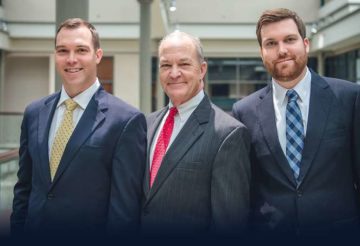Missouri has a variety of motorcycle laws to help keep riders safe. When you comply with the laws, you reduce the chances of a motorcycle accident and minimize the risk of catastrophic injury or death. Following motorcycle laws can also protect your legal rights if you are in an accident.
If you suffered injuries or lost a loved one in a motorcycle wreck, contact a motorcycle accident lawyer for your free case evaluation.
Motorcycle Safety Requirements in Missouri
By law, a motorcycle must have certain safety equipment, and it must be in working order. Every motorcycle must have a headlight, brake light, and taillight. Additionally, the bike must have front and rear brakes, a muffler, a horn, turn signals, and two mirrors.
While the law does not state that the bike must have tires with the proper amount of tread and air pressure, it is to your benefit to ensure the tires have proper air pressure and tread to provide proper traction in all types of weather.
Motorcycle Registration
You must register a motorcycle with the Missouri Department of Motor Vehicles. Additionally, the bike must pass a safety inspection if it is older than five years old. The owner of a bike over five years old must take it in for a reinspection every two years.
Furthermore, motorcycle owners must carry insurance. The minimum limits are $25,000 per person and $50,000 per accident for bodily injury, and $10,000 per accident in property damage insurance.
Missouri’s Motorcycle Helmet Law
Anyone operating or riding a motorcycle must wear a helmet that meets U.S. DOT requirements. If a helmet meets U.S. DOT requirements, it will have a DOT sticker, label with the manufacturer information, helmet information, and month and year of manufacture.
According to the Missouri Department of Revenue, one out of five motorcycle wrecks causes neck or head injuries. These accidents often cause catastrophic injuries or death when the rider or operator is not wearing a helmet. The Department of Revenue also found that wearing a helmet significantly reduces head and neck injuries.
Missouri allows full-face helmets and three-quarter helmets. The helmet should fit snugly and should not have cracks, frayed straps, or loose padding.
Missouri License Requirements for Motorcycles
A motorcycle operator must have a Class M license or a Class M endorsement on their driver’s license. Teens who wish to operate a motorcycle can apply for a permit once he turns 15 years and 182 days.
The applicant must complete a state-approved motorcycle rider training course, plus pass the Class F and Class M knowledge tests. The operator must also pass a vision test and have written permission from her parents or a legal guardian.
Permit holders that have not reached 16 years old also have these restrictions:
- The engine displacement cannot be more than 249 ccs.
- The operator cannot carry a passenger.
- The operator cannot leave a 50-mile radius of his residence.
- The operator cannot ride at night.
If the permit holder is 16 years or older, they can only drive during daylight hours and cannot carry passengers.
Operators must also pass an on-cycle skills test. If the operator takes the test on a trike, she will have a restriction on her license until she passes the skills test on a two-wheeled motorcycle.
Face and Eye Protection
Motorcyclists should also wear face and eye protection via a full-face helmet or a three-quarter helmet with proper eye protection. Regular glasses are usually not enough for full eye protection. The operator should have goggles that wrap around the side of the face.
Eye and face protection protects operators and riders from the debris, bugs, rain, wind, dirt, and rocks from flying into their faces and helps protect the eyes and face in a crash.
Operators and riders should ensure that face and eye protection:
- Do not have scratches.
- Can resist the penetration of hard objects, such as pieces of gravel and small stones.
- Have a clear view of both sides.
- Are securely fastened so that it does not blow off. Regular glasses can blow off since they only rest on your years.
- Allow air through, which prevents fogging.
- Allows enough room for eyeglasses.
Motorcycle Clothing
You often see people riding in sandals, shorts, and even bathing suits. If they wreck, they will have a bad case of road rash and can suffer serious burns from the engine and exhaust.
Wearing appropriate clothing protects you from debris flying at you while riding and helps protect you from more severe injuries should you crash. Riders and operators should wear long sleeves and pants. Leather provides the most protection against injuries. Some sturdy synthetic materials guard against road rash, but leather is the most protective.
Riders and operators should also wear boots or shoes high enough to cover the ankles. The higher boots also give your ankles support if you crash. Gloves also protect the hands from debris flying up from the front of the bike, and leather gloves provide significant protection if you crash.
If you must ride when it is raining, you should have a good rain suit to protect you. It’s uncomfortable and unsafe riding when you’re soaked. It is safest to wear a large rain suit to fit over your leather jacket.
Motorcycle Accident Injuries
Those in a motorcycle accident are more prone to suffering catastrophic injuries or even death because a motorcycle does not offer the same protection a car or truck does and because cars and trucks are much larger and heavier than the bike and person riding.
Injuries a motorcyclist might sustain include:
- Bumps, bruises, cuts, scrapes, and scratches
- Strains and sprains
- Pulled and torn muscles and other soft tissue injuries
- Face and eye injuries
- Internal injuries
- Head, neck, and shoulder injuries
- Simple and compound fractures
- Crushed bones and other crush injuries
- Traumatic brain injuries
- Back and spinal cord injuries
- Chemical and thermal burns
- Road rash
Motorcyclists might also suffer from secondary injuries, such as infections. Whether sustained in the accident or during surgery afterward, open wounds can easily become infected, especially those with compromised immune systems.
Mental health conditions are also an example of secondary injuries. A person who suffers trauma from the accident could experience anxiety or post-traumatic stress disorder. Someone who has catastrophic injuries might suffer from depression because their injuries cause a lasting effect on their quality of life.
Recovering Damages After a Motorcycle Accident
You can recover economic and non-economic damages after an accident. The court orders compensatory damages to make the injured whole again from their losses. While the money does not make you heal faster or bring back a loved one, it reduces the financial stress for the injured and their family.
Economic damages have a monetary value and include medical expenses, lost wages, loss of future earning capacity, replacement or repair of destroyed or damaged personal property, and death-related expenses.
Medical expenses are not just doctors’ bills. They include ambulatory aids, prescriptions, hand controls for a motor vehicle, and upgrades to the home, including wheelchair ramps, grab bars, handrails, and widened doorways.
Medical expenses also include various therapy treatments, including cognitive therapy, occupational therapy, psychological therapy, and physical therapy.
Non-economic damages do not have a clear monetary value. They include pain and suffering, emotional distress, loss of quality of life, loss of companionship or consortium, inconvenience, loss of use of a body part or bodily function, amputation, disfigurement, and excessive scarring.
Motorcycle Law FAQs
+ How can I afford a motorcycle accident lawyer when I am out of work?
Your initial consultation with a motorcycle injury attorney is free. If you decide to retain us, we take your case on a contingency fee basis, which means that you pay nothing unless we win your case. We review our contingency agreement before you retain us so you know the percentage we are owed from your settlement.
+ How do I pay medical expenses when I’m having trouble paying my everyday bills?
You can use your motorcycle and health insurance to cover many of your medical expenses. We can also send a letter of credit to your medical providers requesting they hold off on collections until you likely win a settlement or a trial award.
Once you receive a settlement or trial award, your lawyer will pay any outstanding medical expenses and reimburse your insurance companies for any benefits used.
+ What is compensation for inconvenience?
If you normally do certain chores around the house and your injuries or disabilities do not allow you to do the chores anymore, you’ll have to hire someone to do them for you. You can recover compensation for paying someone to do your grocery shopping, clean your house, mow the lawn, and even house maintenance and repairs.
+ What steps do I take after a motorcycle accident?
In many cases, you might not be able to do anything because of your injuries. You should always ask a loved one to contact a motorcycle accident attorney if you should wreck and cannot call yourself.
If you are in a wreck and can move around without doing additional damage to yourself, call first responders and police and check on other drivers. Obtain driver’s contact information, insurance, registration, and license information. Obtain contact information from any witnesses, including passengers in the vehicle that hit you.
Take photos of the accident scene. Take pictures from all angles and include any damage to the road and nearby property. Give the police your statement and allow emergency medical technicians to examine you.
Once the police release you from the scene, seek medical attention immediately, even if you have no visible injuries. A doctor's exam report can provide important evidence in a legal battle against insurance companies. And lastly, as soon as possible, contact a motorcycle accident lawyer.
+ What do I tell the insurance companies?
You may allow your motorcycle accident attorney to make initial contact with the insurer coving the at-fault party. Alternatively, you can call the insurance company to notify it of the accident. If you make the initial contact, only give the insurance company your name and contact information, the date and location of the accident, and your attorney’s contact information.
If the insurance company presses you for information about the accident, politely refer it to your attorney and end the phone call.
Contact a Missouri Motorcycle Accident Lawyer

Motorcycle accidents often cause more severe injuries than car accidents and may take you out of work for an extended period. After an accident, you should focus on recovering from your injuries and not be overwhelmed with the injury claims process to seek compensation.
Accident cases are complex, especially if you have catastrophic injuries. Instead of worrying about recovering enough money to pay for your medical expenses and other damages, let an experienced motorcycle accident lawyer take that burden off your shoulders.
When you retain experienced motorcycle accident lawyers to handle your claim, they can investigate the case and work with experts to determine the maximum compensation you should receive. They will demand your compensation from the insurance company and begin settlement negotiations to receive a fair settlement.
If the insurance company refuses a fair and reasonable settlement, look for a motorcycle accident lawyer with the skills and experience to represent you in court and fight for the maximum compensation you deserve.
Contact a Missouri motorcycle accident lawyer today for your free case evaluation. Begin the recovery process with a confident legal team behind you, and feel assured that your case will receive the attention it deserves.


